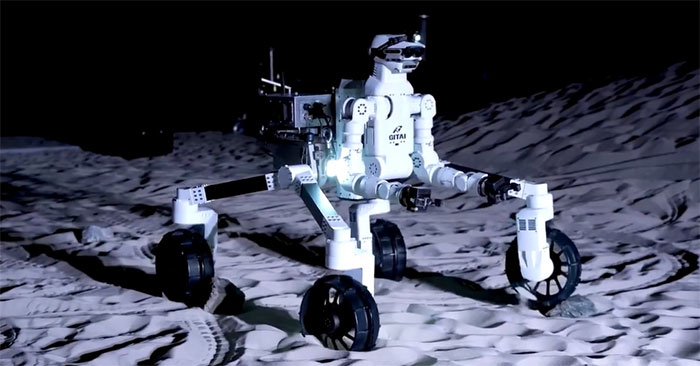Japan builds robot centaur to explore the Moon
The company GITAI collaborated with the Japan Aerospace Exploration Agency (JAXA) to design and build R1, a lunar robot prototype that looks like a centaur, CNN reported on June 10. The robot has 4 wheeled legs, 2 arms in front and 2 cameras instead of eyes.
In a recent test at JAXA's facility with simulated Moon soil, the R1 navigated through rough terrain on four wheels and used a grip-like hand to manipulate the instruments. This is one of many robots that GITAI developed for different purposes. The company's goal is to bring its instrument to the surface of the Moon sometime in the mid-2020s.
R1 also performed a number of exercises to test its ability to overcome bumpy, hilly terrain and collect samples of Moon soil. The video shows it using its hands to pick up a small shovel and a transparent jar, then quickly pick up a small amount of simulated Moon soil.
The use of robots in space is not new. The International Space Station (ISS) already has a robot companion with astronauts and robotic arms, including a Japanese-made one. NASA has also sent several robots to Mars. However, no robot has had the same shape features as R1.

The experimental R1 robot works in a simulated Moon environment.
The GITAI robot is part of a race to develop new vehicles to carry out tasks like mining or manufacturing in space, as China, Russia, the United States and other countries work towards the goal. Build a Moon base. Such bases can carry out both business and scientific activities. Many American companies are also developing other types of robots, rovers and Moon landers for future missions.
JAXA, like NASA, also contracts with private companies in the hope that competition and privatization will spur space technology forward. "Our goal is to succeed in commercializing space robots, thereby reducing space labor costs by 1%. We believe our success will contribute to the real commercialization of spaceflight. time," said Sho Nakanose, CEO of GITAI.
- German robots will explore the Moon
- The US designed a flying saucer to explore the Moon
- Japan will launch artificial satellites on the Moon
- New NASA research: Water and humans can be found on the Moon, so come back soon
- Japan abandoned the mission of exploring the Moon
- Japan builds a robot to cheer extremes
- China plans to build a robot station on the Moon
- Russia is expected to send people to the Moon by 2020
- Europe will bring robots to the moon
- 'Moon Village' is gradually forming?
- Europe builds on the Moon
- The robot sells coffee machines
 Vietnam 5th Asian champion on fuel-efficient vehicles
Vietnam 5th Asian champion on fuel-efficient vehicles We can read all NASA studies completely free of charge
We can read all NASA studies completely free of charge Singer and songwriter Bob Dylan won the 2016 Nobel Prize for Literature
Singer and songwriter Bob Dylan won the 2016 Nobel Prize for Literature Scientific revolution in Asia
Scientific revolution in Asia